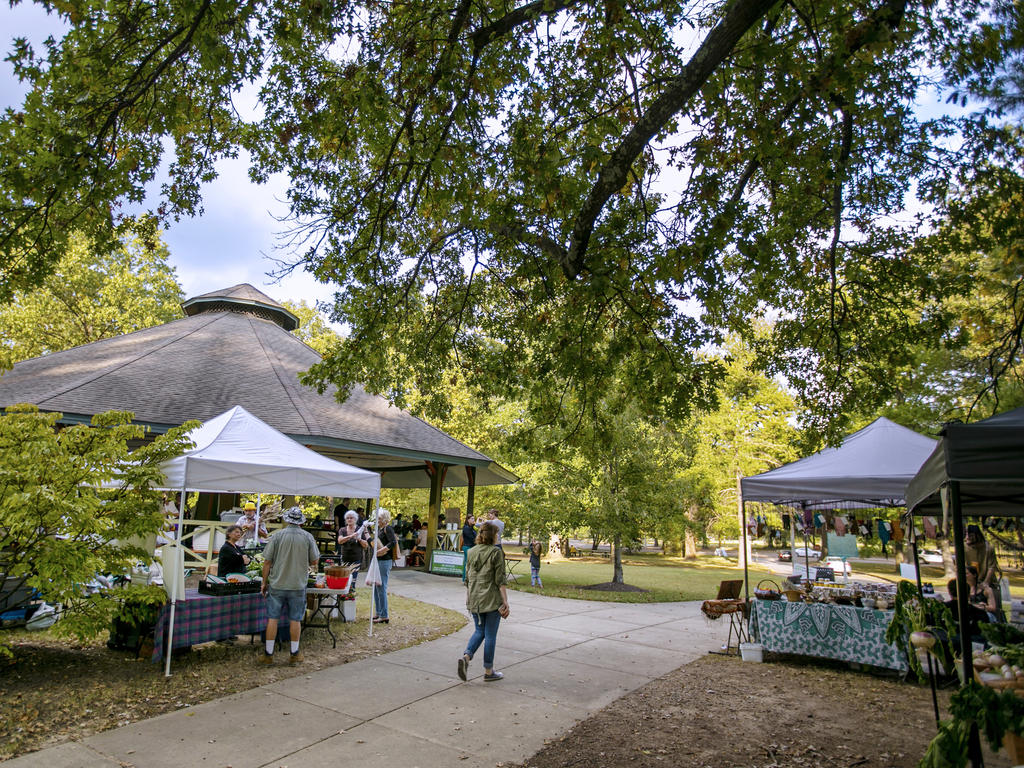Located right across the street from campus, Overton Park is a great resource for the Rhodes College community, from athletes training on its trails to students conducting research to those simply wanting to enjoy its green spaces.
For example, the women’s and men’s cross country teams train in Overton Park several times a week. The runners go on steady and easy tempo runs through the trails, or do threshold miles—runs that are faster and harder—on the park’s gravel inner loop. Coach Robert Shankman and his cross-country teams, in the past, even have made financial contributions in support of the park’s limestone running trail.
“When training, I enjoy the shade from the trees, especially during the summer. Our team would have to travel much farther each day for work outs, or run more on the track, if we couldn’t practice there,” says cross country team member Elise Moix ’20. “Our team also loves seeing and petting the dogs being walked in Overton Park.”
Lauren Roberts ’20, also on the team, adds, “I really enjoy the scenery and the soft surfaces, as well as the chance to get in hill work, which is beneficial to my training. Without the park, we would be forced to run more often on harder surfaces, our paths would be monotonous, and we’d probably have a lot more injuries.”
Overton Park contains the Memphis Brooks Museum of Art, Memphis Zoo, the Levitt Shell, the Greensward, and the Old Forest State Natural Area, as well as spaces to golf, play, or just relax. The park easily slips into the rhythm of Rhodes student life.
“I’ve gone a few times to walk on the trails in the woods to relax around finals. It’s peaceful, and a good way to get away from the stress of school for a little while,” says Moix.
Urban Forestry Fellows Allie Swanson ’20 and Shannon Kane ’20 have conducted research on Overton Park’s usage under the supervision of Dr. Kimberly Kasper of Rhodes’ Environmental Studies & Sciences Program.
“We’ve gone door-to-door in four neighborhoods surrounding the park to find out how and if people use the park, and why they do or don’t,” says Kane. For the most part, their research has shown that people from the different neighborhoods use the park equally. “For example, there are people in Binghampton who run in the park every day, just as people from Vollentine-Evergreen do,” according to Kane.
In their collection of more than 240 surveys (including some answered by Rhodes students), Kasper and her fellows have gained other insights that could help the Overton Park Conservancy better understand the park’s usage and offer suggestions to increase patronage and accessibility for all Memphians. According to Kasper, this research is one of the first of its kind to evaluate park usage from interviewing community members outside the park rather than within.
As part of their fellowships, Swanson and Kane also support the staff of the Overton Park Conservancy, which manages the park. That can mean anything from guiding children on tours of the park to volunteering at a family festival to eliminating invasive plant species from the forest. The fellows have shadowed the conservancy’s director of operations and have even helped with copperhead research in the forest.
“I’ve really appreciated having a green space right beside our campus," says Swanson. “My first weeks at Rhodes, I sort of stumbled upon the park and thought ‘Wow!’ I walked up to the Farmer’s Market and was in love. The park has given me so many opportunities as a student.”
According to Tony Eskridge ’20, the relationship between Rhodes and Overton Park is symbiotic, as classes have been held in the forest, and discussions about the park’s history and changes have appeared in classroom discussions. “The story of the park more broadly tells the story of Memphis in the 20th century,” says Eskridge.
Rhodes alumnus Brooks Lamb ’17 began writing a book about Overton Park his sophomore year, while serving as an intern with the Overton Park Conservancy. The book has been published, and Lamb will return to campus Nov. 27 for a discussion and book signing at 6 p.m. in Blount Auditorium.
By Meg Jerit ’20
